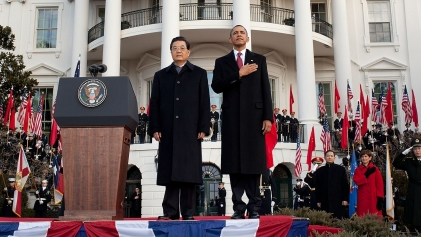What Goes on Behind Closed Summit Doors?

The media frenzy leading up to Chinese President Hu Jintao’s visit to Washington yesterday painted the stakes as being high—extremely high in some cases. Yet the headlines since the summit have focused primarily on technical malfunctions rather than the political implications of the meeting between the world’s two most powerful leaders. What really went on behind closed doors? Could things have taken a disastrous turn? How much room was there for actual negotiation?
Very little, says Fredrik Stanton, author of the book “Great Negotiations: Agreements that Changed the Modern World.” It’s important to remember that summits like the one we saw yesterday are “highly scripted and choreographed,” he tells Big Think. These summits tend to be planned out far ahead of time, leaving little room for actual negotiation. As a counterexample, Stanton points to the 1986 Reykjavik summit between Ronald Reagan and Mikhail Gorbachev, which was unscripted because it wasn’t meant to be a summit at all. “It was supposed to be a quick pre-meeting before a summit in Washington,” he says. “But the fact that they were able to meet face-to-face in an unscripted environment allowed them to develop a chemistry that both sides acknowledged allowed them to race forward and develop a breakthrough in arms control that eliminated an entire class of nuclear weapons.”
And diplomacy will be absolutely crucial in the coming decade of U.S.-Chinese relations, Stanton adds:
“On an economic level, on a military level, on a geopolitical level, China’s beginning to assert itself with its neighbors and globally in a way that it hadn’t before. And that’s going to create tensions when it comes up against American interests, against the interests of its neighbors and other countries. I think the next couple of decades are going to be very important in terms of how we manage that relationship so we don’t see events like the Cuban Missile Crisis, so we don’t see another Cold War, so we don’t see the relationship turn into one of conflict.”
The best thing the United States can do, says Stanton, is to ensure that, on an economic, political, and geo-strategic level, it’s in a strong position. “In the negotiations that I looked at, that generally makes for a better outcome, a quicker outcome, a more certain outcome, and one that is often better for all sides,” he says. “It’s where you have uncertainty that the potential for conflict comes alive. If one or both countries come into a discussion with strong cards and play them well, it generally turns out fairly well for all considered.”
Gideon Rose, the editor of Foreign Affairs magazine, tells Big Think that the United States’ relationship with China is more nuanced and will require “a kind of mixed motive game”:
“We want the Chinese economy to succeed, both for our own purposes and because we think it’s good for China and that ultimately it will cause the political liberalization of China. But at the same time that we want to help China grow, we also are a little bit leery of some of the things that China’s new wealth will allow it to afford, which is a voice in the region, a voice in the world that may not be saying the same things we would like it to say.”





